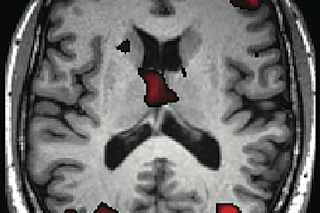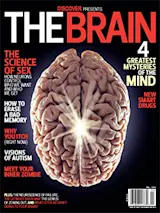Author David Ewing Duncan wearing an EEG cap.
James Brewer takes a seat beside me in a cafe at the San Diego Convention Center, where we are both attending the largest neuroscience meeting in the world: thirty thousand brains researching brains. With his balding head, bright eyes, and baby cheeks, Brewer, a neurologist at the University of California at San Diego, looks like a large and curious toddler. An unlikely messenger, perhaps, in what for me is a moment of truth. I had undergone a series of diagnostic procedures in his laboratory, and now, inside the laptop he has placed on the table, are the results of my brain tests.
“Your brain is shrinking,” he says.
This is the last thing I expected to hear. Not me, a man who considers himself healthy and ageless, at least in his own, er, mind.
“People’s brains begin to shrink when they are ...















